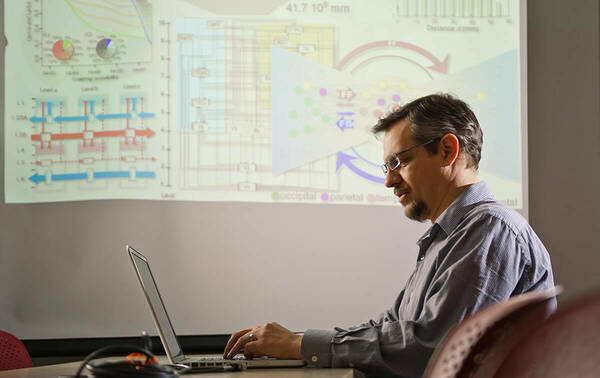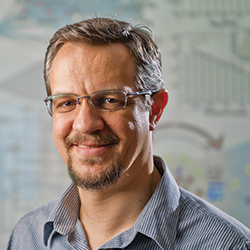
Zoltán Toroczkai and collaborators from both the University of Notre Dame and three for-profit companies won the BMW quantum computing challenge, which called for a method to optimize millions of combinations of test processes that prototype vehicles use before the cars hit the road.

The companies 1QBit, NTT DATA and NTT Research, Inc., a division of NTT, along with Toroczkai’s lab, won out of 70 submissions worldwide, according to a news release.
“The winning team of 1QBit and NTT impresses with hybrid algorithms that enable effective solution finding and achieve very good results on existing hardware,” according to the news release. “In addition, the contribution includes methods for the medium-term improvement of these hybrid algorithms and a solution model for future fault-tolerant quantum computers.”
Toroczkai, professor in the Department of Physics, entered into an agreement with NTT Research in 2020 to engage in fundamental research that can form the foundation for future computing. Toroczkai, who is also a co-director of Notre Dame’s Center for Network and Data Science, has expertise in analog computing and corresponding algorithms that can efficiently find the best solutions to hard optimization problems with many variables.
BMW would like to use quantum algorithms to optimize pre-production vehicles before they are sent onto the road as prototypes, in order to reduce the number of tests the company must do. For instance, does a 2-liter engine work with options such as a certain type of transmission, heated windshield or heated seats? On paper, the processes and features may appear to be compatible, but may interact differently under extreme conditions.
The project’s team developed hybrid algorithms, which are combinations of quantum and classical analog processes. They work somewhat similarly to the brain in that they use both digital (binary/computer-like 0s and 1s) and analog (electrical pulses) signals. They tested them on NTT’s Research’s Coherent Ising Machine, an optical device NTT built that exhibits characteristics of both systems.
Winning the challenge means the team gains the BMW group as a client. The team will work with the automaker on the optimization project, as well as other projects.
“The technology landscape in quantum computing is still in its infancy. Nevertheless, we are convinced that future technologies such as quantum computing have the potential to make our products more desirable and sustainable,” Peter Lehnert, vice president research and new technologies at the BMW Group, said in a news release. “With our crowd innovation approach, we hope to be able to activate additional innovative forces that would not come into play in a normal bidding process.”
Toroczkai said he is pleased the partnership has been recognized for the work they have been undertaking since 2020.
“This win illustrates the power of multi institutional collaborations,” Toroczkai said. “Most real-world problems are highly complex, multidimensional and dynamic and to tackle them one needs the combination of different fields and the joint and sustained effort of research teams working in those fields.”
Originally published by at science.nd.edu on January 20, 2022.